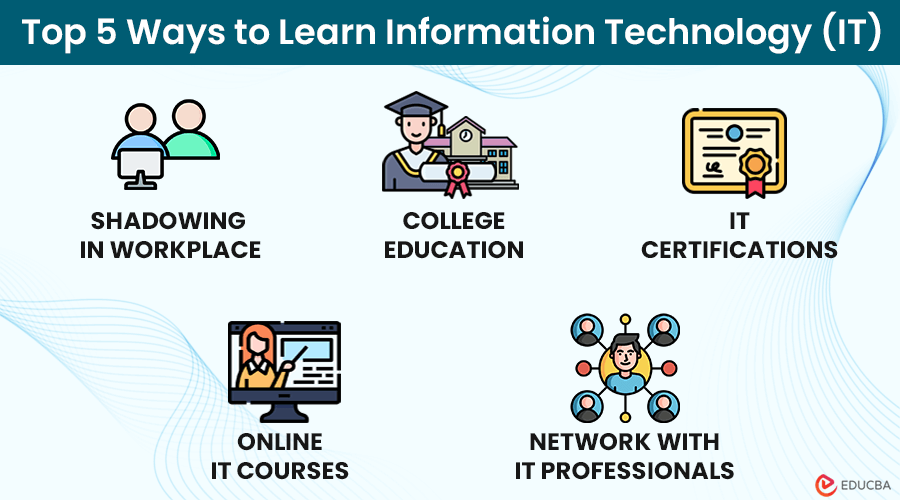
Ways to Learn IT- Overview
Learning IT is essential for many reasons. It can help you find better job opportunities, adapt to evolving technologies, and increase your awareness about cybersecurity. It can also empower you to improve your problem-solving skills and collaborate efficiently. There are many ways to learn IT, such as formal education in academic institutions, self-study (studying C++, JAVA, and Python on your own), and experimenting with hands-on projects.
In this article, we will look at ways to learn IT to acquire knowledge and skills in Information Technology (IT).
Top 5 Ways to Learn IT
Here are some of the best ways to learn IT:
#1. Consider Shadowing in the Workplace
Shadowing is when a new employee or someone in training observes and follows an experienced colleague while they perform their job. It is a hands-on learning method in which the observer gains insights into the responsibilities, tasks, and workflows of the role they are shadowing.
This method is useful in various learning contexts, such as apprenticeships, internships, or professional development.
The shadowing period can vary widely depending on the complexity of the role, the organization’s culture, and the individual’s specific needs. In some cases, shadowing may last just a few days, providing a basic understanding of the role and its responsibilities. In other situations, shadowing could extend for weeks or even months, particularly for more complex or specialized positions.
If shadowing interests you, reach out to IT professionals such as Network Right and ask if they have any opportunities available.
#2. Consider College Education
In the IT field, a college degree is not always a must-have. In fact, more than 25% of IT professionals do not hold college degrees. However, going to college can have its advantages. It can give you a deeper understanding of Information Technology, especially if you are not keen on starting with certifications immediately.
One of the most valuable aspects of college is the opportunity to network. By creating a LinkedIn profile and connecting with like-minded peers, you build a professional community that can open doors to future job opportunities. Additionally, colleges often host networking events. These events provide a platform to meet industry professionals.
While having a college degree does not guarantee a job, it can certainly give you an edge when applying for entry-level positions. However, keep in mind that a degree alone is not enough. You will still need to obtain certifications to bolster your skills and qualifications. So, it is essential to strike a balance between earning your degree and pursuing certifications simultaneously.
#3. Pursue Relevant Certifications
When you are just starting in Information Technology (IT), it is smart to get certified in basics like Help Desk Institute (HDI), Desktop Support Technician (DST), Information Technology Infrastructure Library (ITIL) Foundation, Linux Essentials, and Cisco Certified Entry Networking Technician (CCENT).
As you get more experienced, you can aim for more advanced certifications, like
- Certified Information Security Manager (CISM),
- Certified Information Systems Security Professional (CISSP),
- Certified Penetration Testing Engineer (CPTE)
As you advance in your career, big companies will want to see you are up-to-date with the latest technology. Certifications can cover different areas, such as classic IT, networks and cloud technology, hardware, IT management, data storage, web and mobile, or teaching others with Microsoft Certified Trainer (MCT).
For beginners, it is good to pick one area of IT to focus on at first. Instead of trying to know everything, becoming an expert in one thing is better. Later on, you can branch out if you want. Each certification you earn opens up more opportunities for you.
#4. Enroll in Online IT Courses
There is much to learn in IT, from cloud computing to cyber security and artificial intelligence. To deepen your expertise, it is helpful to explore online courses. Websites like EDUCBA and Udemy offer a wide range of well-made courses that cover these subjects thoroughly.
The flexibility of online courses is a significant advantage. Unlike traditional classroom settings, you can learn at your own pace and schedule. This convenience allows you to balance your professional and personal commitments while advancing your IT expertise. Regardless of your experience level, online resources provide valuable chances for growth and development in the constantly changing technology field.
#5. Network with IT Professionals
Networking with IT professionals is crucial for staying updated with the trends and opportunities in the field. Start by attending industry events like conferences, seminars, or meetups where you can associate with professionals from various IT domains. Engage in conversations, swap business cards, and follow on LinkedIn to nurture your network. Additionally, participating in online discussions and communities dedicated to IT topics can help expand your circle and access valuable insights and resources experienced professionals share. Networking involves gaining benefits and, giving back, and forming mutually advantageous connections within the IT community.
Moreover, do not underestimate the power of building relationships within your organization. Take the initiative to connect with coworkers from different departments, especially those in IT or related fields. To establish rapport and credibility, offer assistance, share knowledge, and express interest in their projects. These internal connections can provide valuable support and insights, enhance collaboration, and create opportunities for career growth within the company. By actively networking both externally and internally, you can stay informed, inspired, and well-positioned for success in the dynamic world of IT.
Final Thoughts
Getting into IT requires a mix of learning methods. Beginners do well with formal education or online courses, while those more advanced benefit from certifications and shadowing experiences. Continuous learning is key in this fast-changing field, where technology evolves quickly.
Remember, IT is not just a subject but a constantly evolving landscape requiring ongoing education and adaptation. Whether you are starting or advancing your career, staying informed and connected ensures success in the IT industry.
Recommended Articles
If you found this article helpful and want to learn more about ways to learn IT and related topics, please check the links below for further information.
